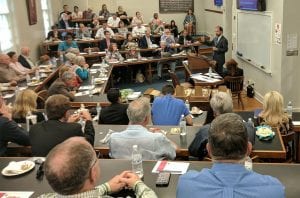
President Trump threatened to “totally destroy North Korea” in a speech at the United Nations Sept. 19. Sen. Bob Corker, Chairman of the Senate Foreign Relations Committee, responded that this rhetoric could lead the United States to World War III.
Daryl G. Kimball, executive director of the Arms Control Association, visited the Tower Center to present his lecture “The North Korean Missile Threat” Oct. 12. Kimball argues that tensions are as high as they were in October 1962 — the Cuban Missile Crisis.
Though North Korea has been a nuclear state for roughly three decades now, the rate of missile testing has increased exponentially under the regime of Kim Jong-un, who became Supreme Leader of North Korea after his father’s death in 2011. President Trump inherited this missile crisis when he took office in January, Kimball argues, but his administration, and specifically his tweets, have only increased the risk of conflict and worsened the relationship between the United States and North Korea.
The Trump administration’s strategy toward North Korea has been “maximum pressure and engagement.” Kimball believes that yes, the pressure has been applied, but in the form of empty threats and without the balancing act of engagement.
The North Korean threat
As of now, after several tests of the Hwasong-12 missile, we know North Korea has the capability to strike South Korea, parts of Japan, and the U.S. island territory of Guam with a nuclear-tipped short to medium ranged missile. North Korea also tested an intercontinental ballistic missile (ICBM) for the first time in July, the Hwasong-14, which would theoretically make Western U.S. cities like Seattle and Los Angeles potential targets, but analysts disagree on the missile’s exact range. If North Korea continues to test, Kimball claims they could have the capability to confidently strike the continental U.S. within one to two years.
What Kim Jong-un wants
The highest priority of Kim Jong-un and the Worker’s Party of Korea is regime preservation; they want the Kim dynasty to remain in power. Kim himself is paranoid. He is convinced that the United States wants to invade North Korea and fight a war in order to force regime change.
What we can’t do
The U.S. strategy so far has been to impose sanctions and to build up missile defense (which aims to strike down a missile launched by an enemy before it reaches it target), but we can’t rely on either, according to Kimball. Though sanctions are a useful tool they will not stop Kim from testing nuclear missiles. Additionally, while missile defense is helpful in specific situations, it is not developed to help in a surprise attack, which is the most likely scenario in this case.
Some military experts advocate for a precision first strike to neutralize the nuclear threat. (A precision first strike is an attack on an enemy’s nuclear arsenal to eliminate the enemy’s ability to retaliate.) But U.S. intelligence on North Korea is not excellent, making it almost certain that at least one of North Korea’s missiles would be left standing after the strike. As far as conventional options go, the U.S. could absolutely succeed in a military conflict, but it would come at a great cost — millions of lives.
“Are there military options?” Kimball asked. “Of course. But we don’t like them.”
What we can do
Kimball advocates for third-party diplomacy. He argues that no progress can be made between a leader who has never heard “no,” Kim Jong-un, and a leader with an over-sized ego, President Trump. He said in order to engage North Korea in discussions, the United States must acknowledge North Korea’s security concerns. The U.S. should send someone else in to initiate dialogue, whether it be French President Macron (who has volunteered for the job), a religious figure, or someone else. In the meantime, Kimball argues, President Trump must tone down his rhetoric.
He closed his lecture with a quote from President John F. Kennedy after the Cuban Missile Crisis in 1962: “Above all, while defending our own vital interests, nuclear powers must avert those confrontations which bring an adversary to the choice of either a humiliating defeat or a nuclear war.”